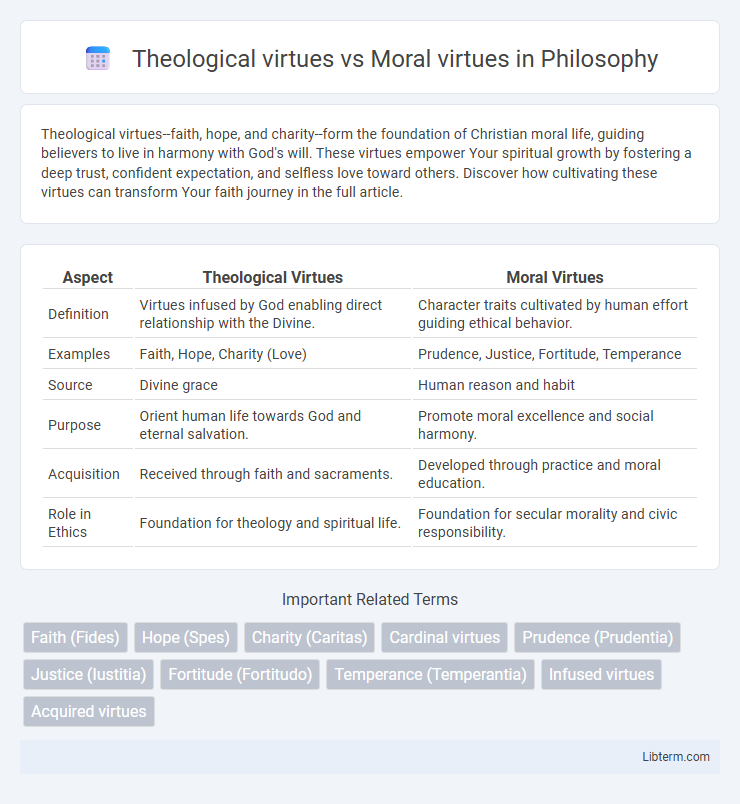Theological virtues--faith, hope, and charity--form the foundation of Christian moral life, guiding believers to live in harmony with God's will. These virtues empower Your spiritual growth by fostering a deep trust, confident expectation, and selfless love toward others. Discover how cultivating these virtues can transform Your faith journey in the full article.
Table of Comparison
| Aspect | Theological Virtues | Moral Virtues |
|---|---|---|
| Definition | Virtues infused by God enabling direct relationship with the Divine. | Character traits cultivated by human effort guiding ethical behavior. |
| Examples | Faith, Hope, Charity (Love) | Prudence, Justice, Fortitude, Temperance |
| Source | Divine grace | Human reason and habit |
| Purpose | Orient human life towards God and eternal salvation. | Promote moral excellence and social harmony. |
| Acquisition | Received through faith and sacraments. | Developed through practice and moral education. |
| Role in Ethics | Foundation for theology and spiritual life. | Foundation for secular morality and civic responsibility. |
Introduction to Virtues: Theological vs Moral
Theological virtues--faith, hope, and charity--directly relate to God and orient the soul toward divine communion, whereas moral virtues, including prudence, justice, fortitude, and temperance, govern ethical behavior in human interactions. Theological virtues infuse moral virtues with grace, enabling believers to live in harmony with God's will. Understanding the distinction between these two types of virtues clarifies their roles in spiritual growth and ethical decision-making.
Defining Theological Virtues
Theological virtues are faith, hope, and charity, infused by God into the souls of believers to enable a supernatural relationship with Him, distinct from moral virtues which are habits developed through human effort to promote ethical behavior. These virtues orient individuals directly toward God, forming the foundation of Christian life and spirituality. Unlike moral virtues that perfect natural faculties, theological virtues perfect the soul's capacity for divine connection and eternal salvation.
Understanding Moral Virtues
Moral virtues are habitual dispositions that guide human actions toward good and contribute to moral excellence, shaped by reason and free will. These virtues, such as prudence, justice, temperance, and fortitude, are acquired through practice and deliberate choice to promote human flourishing and ethical behavior. Unlike theological virtues, which are infused by divine grace, moral virtues develop through consistent effort and cultivate character in alignment with natural law.
Origins and Foundations of Each Virtue Type
Theological virtues--faith, hope, and charity--originate directly from divine infusion by God, rooted in supernatural grace and essential for spiritual salvation. Moral virtues--prudence, justice, temperance, and fortitude--arise from human nature and reason, developed through habitual good acts and guided by natural law. The foundations of theological virtues lie in transcendent divine revelation, while moral virtues are grounded in human experience and rational discernment.
Theological Virtues: Faith, Hope, and Charity Explained
Theological virtues, comprising Faith, Hope, and Charity, are divine gifts that orient believers directly toward God and eternal life. Faith involves trusting in God's revelations and promises, Hope sustains the expectation of salvation, while Charity enacts selfless love reflecting God's love for humanity. These virtues differ fundamentally from moral virtues by their supernatural origin and focus on spiritual union with God rather than solely ethical behavior.
Cardinal Moral Virtues: Prudence, Justice, Fortitude, Temperance
Theological virtues--faith, hope, and charity--direct the soul toward God, while moral virtues guide human behavior in daily life. The Cardinal Moral Virtues, prudence, justice, fortitude, and temperance, serve as foundational principles for ethical decision-making and character development. Prudence governs practical wisdom, justice ensures fairness and rights, fortitude enables courage in adversity, and temperance controls self-indulgence, collectively shaping moral integrity.
Relationship Between Theological and Moral Virtues
Theological virtues--faith, hope, and charity--directly orient the soul toward God, establishing a divine foundation for moral virtues such as prudence, justice, fortitude, and temperance, which govern human behavior in relation to others and oneself. Moral virtues are perfected and elevated by the infusion of theological virtues, creating a harmonious interplay where theological virtues infuse moral virtues with grace and divine purpose. This integration ensures that ethical actions are not only good in a human sense but also aligned with God's will, fostering spiritual growth and ultimate salvation.
Distinct Roles in Spiritual and Ethical Life
Theological virtues--faith, hope, and charity--directly orient the soul towards God, fostering a deep spiritual relationship and divine grace. Moral virtues such as prudence, justice, fortitude, and temperance govern human behavior in ethical decision-making, promoting harmony within society and self-discipline. Together, these virtues integrate spiritual growth with moral integrity, supporting holistic development in both divine and human contexts.
Application in Daily Christian Practice
Theological virtues--faith, hope, and charity--directly orient Christians toward God, shaping prayer, worship, and trust in divine providence in daily life. Moral virtues, such as prudence, justice, fortitude, and temperance, guide ethical behavior and decision-making in interactions with others and personal discipline. Integrating theological virtues with moral virtues fosters holistic spiritual growth and practical holiness in everyday Christian practice.
Conclusion: Integrating Theological and Moral Virtues
Integrating theological virtues--faith, hope, and charity--with moral virtues such as prudence, justice, fortitude, and temperance fosters holistic character development that aligns human actions with divine will. This synergy cultivates both spiritual growth and ethical behavior, ensuring individuals not only act rightly but also nurture a relationship with God. Achieving this balance enhances personal integrity and promotes a virtuous society rooted in both faith and reason.
Theological virtues Infographic

 libterm.com
libterm.com